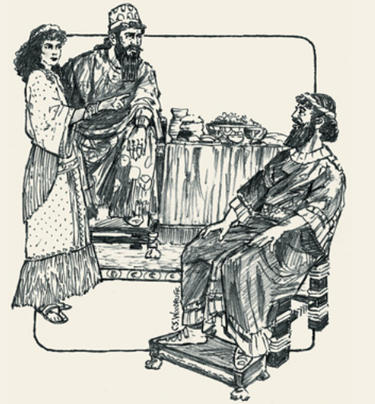The story of Esther and Mordecai transcends time and culture. The situation they faced still applies and teaches valuable spiritual lessons. We should have godly, loving faith built on a loving, trusting relationship with God.

Esther turned and pointed toward Haman: “The adversary and enemy is this wicked Haman!” Haman was mortified.
Source: Illustration by Michael Woodruff
The Jewish exile Mordecai knew the situation was dire and dangerous. Through a sinister plot, the Jews in Persia were secretly condemned to death (Esther 3). Mordecai pleaded with Queen Esther to risk her life: "If you remain completely silent at this time, relief and deliverance will arise for the Jews from another place, but you and your father's house will perish. Yet who knows whether you have come to the kingdom for such a time as this?" (
Esther:4:14).
The story of Esther and Mordecai transcends time and culture. The situation they faced still applies and teaches valuable spiritual lessons.
Setting for the Story
Esther's story takes place near the end of the events described in the Old Testament. The two kingdoms of Israel and Judah had fallen and been taken into captivity in Assyria and Babylon, respectively.
By this time, several hundred years after their fall, the descendants of Israel—the "lost 10 tribes"—had scattered and disappeared from the Middle Eastern map. The descendants of Judah, however, had maintained their beliefs and way of life while in Babylon. However, Babylon, too, had fallen, and now the Jews lived under the benign rule of the Persian Empire.
The Persians had allowed Jews willing to make the long overland journey the opportunity to return to Jerusalem and their homeland. Although many had made the trip, many more had decided to remain where were and put down roots.
The book of Esther is a complement to the books of Ezra and Nehemiah. Although those books describe life for the Jews who returned to Palestine, Esther is the only Bible book that offers a portrait of those who chose to remain in Persia.
The book of Esther introduces us to a great king of Persia known as Ahasuerus (Hebrew), or Xerxes (Greek). In 479 B.C. the Greeks defeated Ahasuerus in the battle at Salamis.
The Greek historian Herodotus wrote that the Persian king sought consolation in his harem after his defeat. He gave a huge banquet, lasting several days, for palace personnel (
Esther:1:1-8). At that time Queen Vashti— wife of Ahasuerus—gave a banquet for the women of the palace. On the seventh day of his banquet, the king commanded Vashti to appear before his court so everyone could behold her beauty (
Esther:1:9-11).
But the queen refused to appear before her husband. So Ahasuerus, on the advice of his counselors, decided to look for someone to replace her as queen.
The king's servants came up with a plan: "Let beautiful young virgins be sought for the king; and let the king appoint officers in all the provinces of his kingdom, that they may gather all the beautiful young virgins to Shushan the citadel, into the women's quarters, under the custody of Hegai the king's eunuch ... Then let the young woman who pleases the king be queen instead of Vashti" (
Esther:2:2-4). The king agreed and looked forward to the prospect of a beautiful wife who could become his new queen.
Esther Becomes Queen
Mordecai was an older cousin of Esther's who had helped raise her: "And Mordecai had brought up Hadassah, that is, Esther, his uncle's daughter, for she had neither father nor mother" (
Esther:2:7). They lived in Shushan.
The king's decree brought to his palace many beautiful young women, but none was more beautiful than Esther. From the beginning Hegai, a eunuch and custodian of the women, favored Esther favor, "so he readily gave beauty preparations to her, besides her allowance" (
Esther:2:9).
In turn, each young lady was presented before the king. When it came Esther's turn, she was allowed to choose her attire. However, "she requested nothing but what Hegai the king's eunuch, the custodian of the women, advised. And Esther obtained favor in the sight of all who saw her" (
Esther:2:15). Hegai knew the king's social tastes. She deferred to his advice.
Finally, Esther was presented before the king. "The king loved Esther more than all the other women, and she obtained grace and favor in his sight more than all the virgins; so he set the royal crown upon her head and made her queen instead of Vashti. Then the king made a great feast, the Feast of Esther, for all his officials and servants; and he proclaimed a holiday in the provinces and gave gifts according to the generosity of a king" (
Esther:2:17-18). Thus Esther became queen of Persia.
Mordecai Averts Assassination
One day Mordecai, now a royal official, found that two of the king's doorkeepers planned to assassinate the king. Mordecai told Esther, who promptly warned the king. The king hanged the men. These proceedings, including Mordecai's faithful disclosure, were "written in the book of the chronicles in the presence of the king" (
Esther:2:23).
Throughout this time Esther, on Mordecai's advice, had not told the king of her family background or that she was related to Mordecai.
Haman's Jealous Plot
Another chain of events then began that would threaten Esther and Mordecai.
King Ahasuerus promoted Haman, one of his officials, above all other officials and nobles. By the king's order all the others were to bow and pay homage to Haman. But Mordecai, faithful to God's instruction that prohibited the veneration of anyone but God (
Exodus:20:5), refused.
Others noticed Mordecai's refusal to bow to Haman. They confronted Mordecai, who still refused. Then they told Haman.
Haman grew furious (
Esther:3:5). He determined that Mordecai was a Jew, prompting him to craft a plan to kill not only Mordecai but all the Jews throughout Persia—because of Mordecai's refusal to honor him.
Haman and his accomplices cast lots to determine the best day to massacre the Jews. They decided the best day to carry out their perfidy would arrive some 11 months later. Haman presented his plan, couched in deceptive language to hide his motivation, to the king.
"There is a certain people scattered and dispersed among the people in all the provinces of your kingdom; their laws are different from all other people's, and they do not keep the king's laws. Therefore it is not fitting for the king to let them remain. If it pleases the king, let a decree be written that they be destroyed, and I will pay ten thousand talents of silver into the hands of those who do the work, to bring it into the king's treasuries" (
Esther:3:8-9).
The king, alarmed at this perceived threat, foolishly agreed: "The money and the people are given to you, to do with them as seems good to you" (
Esther:3:11). The decree gave any Persian the right to kill Jews and loot their property. The city of Shushan and the palace were in confusion over this bizarre decree.
Mordecai's Sacrificing Service
When Mordecai heard of the decree, he tore his clothes and put on sackcloth and ashes as a sign of tragedy and mourning. He walked through the city crying bitterly (
Esther:4:1).
Esther's servants relayed the news to her. Not yet understanding the gravity of the situation, she sent clean garments to Mordecai. He refused them. Esther then sent her servant Hathach to discover why Mordecai refused the garments. Mordecai sent details and proof of Haman's heinous plan to destroy the Jews and urged the servant to ask Esther to approach the king and plead for the lives of the Jews.
When Esther heard of Haman's plan and Mordecai's request, she was at first undecided over how she should proceed. She knew that to come before the king without a formal invitation, even though she was the queen, could mean she would be put to death (
Esther:4:11). She sent word of her predicament to Mordecai.
Mordecai's advice was sobering yet filled with faith. "Do not think in your heart that you will escape in the king's palace any more than all the other Jews. For if you remain completely silent at this time, relief and deliverance will arise for the Jews from another place, but you and your father's house will perish. Yet who knows whether you have come to the kingdom for such a time as this?" (
Esther:4:13-14).
Yes, Mordecai told her, Esther would risk her life if she approached the king uninvited. But if she didn't she and her relatives would be killed in the coming slaughter, he warned. Mordecai knew God would ultimately preserve the Jewish people and pointedly asked Esther to consider whether her influence could provide the deliverance of her people from catastrophe.
A Fateful and Faithful Decision
Esther knew what she must do. First she requested that the Jews in Shushan join her in a three-day fast to humble themselves and seek God's intervention. She would then approach the king, willing to accept the consequences, "and if I perish, I perish!" (Esther 4: 16).
Still fasting, Esther dressed in her royal robes and called upon the king, unsure of her fate.
Immediately the king held out his golden scepter to her, welcoming her presence.
"What do you wish, Queen Esther?" the king asked. "What is your request? It shall be given to you—up to half my kingdom!" (
Esther:5:3).
Esther answered the king wisely and humbly: "If it pleases the king, let the king and Haman come today to the banquet that I have prepared for him."
The king reacted promptly: "Bring Haman quickly, that he may do as Esther has said" (
Esther:5:4-5).
King Ahasuerus and Haman were obviously thrilled to attend Esther's banquet. The king again invited Esther to state her request. Her reply: "If I have found favor in the sight of the king, and if it pleases the king to grant my petition and fulfill my request, then let the king and Haman come to the banquet which I will prepare for them, and tomorrow I will do as the king has said" (
Esther:5:8).
A Sudden Turn
Haman was beside himself. He excitedly relayed the news of his unexpected good fortune to his wife and friends: "Besides, Queen Esther invited no one but me to come in with the king to the banquet that she prepared; and tomorrow I am again invited by her, along with the king."
Nevertheless Haman was still jealous and bitter: "Yet all this avails me nothing, so long as I see Mordecai the Jew sitting at the king's gate" (
Esther:5:12-13).
Haman's wife and his friends had an idea sure to cheer up Haman: "Let a gallows be made, fifty cubits [75 feet] high, and in the morning suggest to the king that Mordecai be hanged on it; then go merrily with the king to the banquet" (
Esther:5:14).
Haman's sullen face suddenly erupted in a wide grin. He immediately ordered the gallows built.
On the night before Esther's banquet, however, the king couldn't sleep. He told one of his servants to read to him the royal chronicles.
The king's servant read aloud how Mordecai had averted the earlier plot to assassinate the king (
Esther:6:1-2). Reminded of this event, the king asked his servants, "What honor or dignity has been bestowed on Mordecai for this?" The servants responded that nothing had been done (
Esther:6:3). This shocked the king. This oversight could forever tarnish the king's otherwise magnificent reign.
The king asked if someone of high rank might be present in the court to help correct this oversight. Haman had just entered the outer court of the king's palace. His jealousy and anger toward Mordecai had moved him to approach the king late at night. Ironically, both Haman and the king had Mordecai on their minds.
The king's servants said that Haman had just entered the court. "Bring him in before me," said the king.
When Haman approached, the king asked him: "What shall be done for the man whom the king delights to honor?" (
Esther:6:6).
Haman couldn't believe his ears. How could things get any better for him? Now, finally, others would be forced to acknowledge his greatness.
Haman replied without hesitation: "For the man whom the king delights to honor, let a royal robe be brought which the king has worn, and a horse on which the king has ridden, which has a royal crest placed on its head. Then let this robe and horse be delivered to the hand of one of the king's most noble princes, that he may array the man whom the king delights to honor. Then parade him on horseback through the city square, and proclaim before him: 'Thus shall it be done to the man whom the king delights to honor!' " (
Esther:6:7-9).
Ahasuerus was pleased with Haman's suggestion. He instructed him to hurry and perform what he suggested, to take the robe and the horse "and do so for Mordecai the Jew ...! Leave nothing undone of all that you have spoken" (
Esther:6:10).
Haman was astonished. Yet he was so full of pride, so intent on currying favor with the king, that he did exactly as he was told.
Haman found himself forced to honor the man who would not bow to him. He told his wife and friends of this bewildering turn of events. Listening carefully, they predicted where things were headed: "If Mordecai, before whom you have begun to fall, is of Jewish descent, you will not prevail against him but will surely fall before him" (
Esther:6:13).
Shortly afterward, the king's eunuchs found Haman and whisked him away to Esther's banquet.
Haman's Downfall
For the second time the king and Haman dined with Queen Esther. The king repeated his magnificent offer to grant her any request, up to half of his kingdom. Finally Queen Esther presented her request: "If I have found favor in your sight, O king, and if it pleases the king, let my life be given me at my petition, and my people at my request. For we have been sold, my people and I, to be destroyed, to be killed, and to be annihilated. Had we been sold as male and female slaves, I would have held my tongue, although the enemy could never compensate for the king's loss" (
Esther:7:3-4).
The king was furious: "Who is he, and where is he, who would dare presume in his heart to do such a thing?" (
Esther:7:5).
Esther turned and pointed toward Haman: "The adversary and enemy is this wicked Haman!" (
Esther:7:6).
Haman was mortified. How could things have gone so wrong? The king was so angry he could not speak. He stormed out into the palace garden. The desperate Haman began begging Queen Esther for his life. So distressed was he over the turn of events that he lost his equilibrium and fell across the couch on which Esther was seated.
Just then the king, his temper having cooled somewhat, reentered the banquet room only to see what appeared to be a clumsy attempt by Haman to molest his beloved wife, the queen of Persia! He roared, "Will he also assault the queen while I am in the house?" (
Esther:7:8).
One of the servants exclaimed to the king: "Look! The gallows, fifty cubits high, which Haman made for Mordecai, who spoke good on the king's behalf, is standing at the house of Haman" (
Esther:7:9).
"Hang him on it!" the king commanded.
Immediately the king's servants hanged Haman on his own towering gallows, and only then was the king's anger abated.
Esther informed the king that Mordecai was her cousin. Immediately the king summoned Mordecai and gave him Haman's signet ring. Queen Esther appointed Mordecai to oversee the house of Haman.
Esther's Countrymen Delivered
Even so, the potential annihilation of the Jews throughout Persia still threatened. According to Persian law, once the king had issued a decree and sealed it with his signet ring, it could not be revoked.
Esther reminded the king of Haman's deceitful plot to destroy her people; she pleaded for their lives. Although he could not revoke the earlier decree, the king allowed Esther and Mordecai to write a counterdecree that would enable the Jews to arm themselves and band together against any who would attack them.
When the fateful day arrived, the Jews overcame their enemies (
Esther:9:1-11). To express their thanks to God, the Jews instituted the Feast of Purim. The name of this feast is a reminder of Haman's casting of lots (
pur means "lot") and God's deliverance of the Jews from their enemies on the day they were to be annihilated (
Esther:9:17-32).
Esther, Jewish queen of gentile Persia, set a remarkable example of personal sacrifice. Although understandably at first hesitant, she willingly risked her life so others could be saved. In this respect she prefigured the sacrifice of the coming Messiah, Jesus of Nazareth, who willingly gave His life so each of us could have the opportunity to receive God's gift of salvation, eternal life in His Kingdom.
Similarly, Christ expects His followers, His saints, to be willing to put their lives on the line to follow Him (
John:15:13).
Speaking of His followers, God's Word describes them as having overcome Satan "by the blood of the Lamb and by the word of their testimony, and they did not love their lives to the death" (
Revelation:12:11).
Like faithful Esther and Mordecai, we should have godly, loving faith built on a loving, trusting relationship with Him. To see how you can develop such a relationship with your Creator, be sure to the Bible study aid
You Can Have Living Faith .


